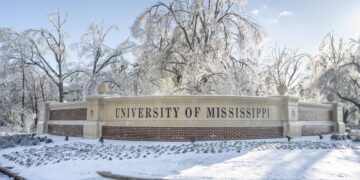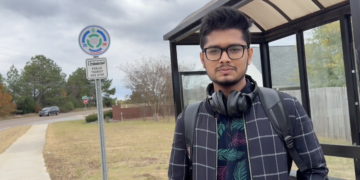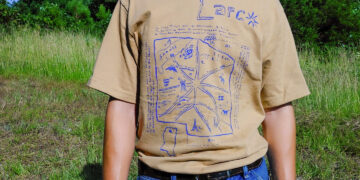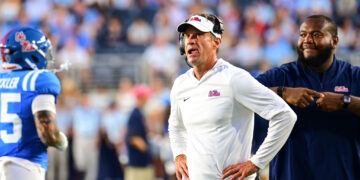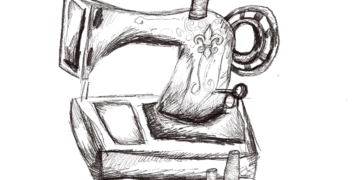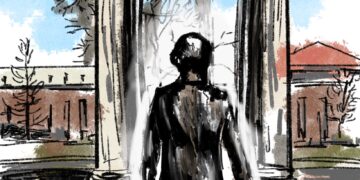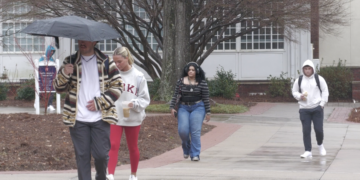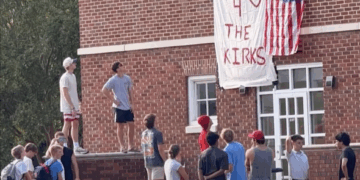When walking around Oxford’s Courthouse Square, the red brick, book-filled windows and stone marquee reading “Square Books” are hard to miss. It’s hard to believe that such a charming and welcoming building is a cornerstone for storytellers in the South and how long the store has been giving authors this platform.
Square Books and its branches, just like any other brick and mortar bookstore, have not been immune to the changing book-buying landscape. Amazon, the ongoing pandemic and supply chain issues with publishers have all been a part of a list of issues that most bookstores have been facing over the past couple of years. Despite this, the “family” of four bookstores, with Rare Square Books making its most recent addition in 2020, seems to be unshaken by the challenges that have landed on their front door.
An ever-present companion in the year of being alone.
The City of Oxford and the state of Mississippi have seen their own challenges since the beginning of the pandemic in March of 2020, and the family of bookstores that have found their homes around the Square have not been immune to these challenges.
With the constant changes made at city and state level, Richard Howorth, one of the owners and founders of the family of Square Books stores, said that the stores simply did what they could at the beginning.
“Well you know, necessity is the mother of invention, and we really just tried to take everything one day at a time,” Howorth said.
Before the pandemic, Square Books primarily focused on selling books at their storefront. They had a functioning website, but not one that kept up with their current stock on hand — and no way to deliver books. This was the first of many changes that the team at Square Books had to adapt to.
In the pivot, Howorth said that they saw an increase in the number of gift cards bought in March 2020, when everything began to shut down.
“We saw we had twice as many sales in gift cards last year than we had this year. And that’s because people wanted to support us and knew that they could use a gift card a month later,” Howorth said.
Both Richard Howorth and his wife/business partner were thankful for the wave of support that appeared during the pandemic. Although there wasn’t any lack of support before March 2020, they were touched by the gesture during this hard time.
This is not the case for most American bookstores. According to a Vox article citing the American Bookstore Association, 35 member stores have closed since October of 2020.
“I think there’s a lot to be said about the support we got during the first part of the pandemic,” Howorth said.
Both Howorth and his wife/business partner were thankful for the wave of support that appeared during the pandemic. Although there wasn’t any lack of support before March 2020, they were touched by the gesture during this hard time.
“Amazingly, we’ve had really consistent, great community support, and now we have a lot of tourist support. It’s amazing that we’ve been able to do that during the pandemic,” Lisa Howorth, the co-founder of the original bookstore and Richard Howorth’s wife said.
Despite the fair share of support, Square Books had faced challenges up to current times. Lisa Howorth said that the two biggest setbacks that the store has had were the opening of the Barnes and Noble at the university in the early 2000s and the launching of Amazon in 1995. Lisa Howorth emphasized the importance of supporting local brick and mortar stores, regardless of what they sell.
“If you don’t support your brick and mortar, independent stores in your town, you’re not going to have them. And that includes places like Sneed’s Hardware Stores, you know, Nelson’s Department Store, all kinds of stuff, all kinds of businesses, and of course, it affects us, but we kind of clambered out of the original setback,” Lisa Howorth said.
Like many independent bookstores, all prior setbacks came to a head in March 2020. General manager at Square Books for over 20 years, Lyn Roberts said she had a similar experience that many students had.
“I went away for spring break, and then came back and like a day later, we shut down,” Roberts said.
On March 18, 2020, the business took to Instagram to announce that, because of COVID-19, all in-store business would be suspended until further notice. The post encouraged supporters of the store to continue to purchase books through other methods, whether that be shipping, over the phone or local deliveries.
“We embrace the challenge ahead to be smart, be safe, and be done with this virus,” the post said.
Roberts said that the most frightening part of the weeks after was how little was known about the virus on all ends.
“We didn’t really know how long this was going to last. I had a good idea about how long the store can last without business, what sort of reserves we have, and we just didn’t know whether the pandemic was gonna last longer than that,” Roberts said.
Numbers continued to fluctuate with online and eventually in-store sales as early as June of last year. This shows up in a more recent report that the American Bookstore Association, a nonprofit organization for booksellers, did to track numbers on Black Friday, Small Business Saturday and Cyber Monday in 2021. The report cited “highest annual spike in online traffic and sales revenue for the year” and said that e-commerce bookstore sales were up 217.51%.
Despite numbers continuing to fluctuate over the next couple of months and years, Roberts said that there was an international scale of support that had been outpoured since the initial shift in March.
“We have customers all over the world, and we ship things, and everyone was very supportive then and I don’t think that was just us, I think people were very sort of outgoing and very supportive of local independent businesses,” Roberts said.
In the onslaught of the pandemic, Roberts believes that many people have realized the value in local businesses, especially local and independent bookstores.
“I think (more people) recognize that…local independent businesses are actually sort of the backbone of the economy, and certainly, of communities,” Roberts said. “That’s really kind of what makes some communities special is their independent stores that they have, that sense of community and coming together was extraordinary.”
These four walls and beyond.
A cornerstone of the store has been its support of authors far and wide, often bringing these successful authors to the store’s readers in Oxford. Founding director of the Center for Southern Studies and Culture at the University of Mississippi, Bill Ferris, took his position around the same time Square Books opened in 1979.
“Bill was a friend and an ardent supporter of the store, and he was very well connected,” Richard Howorth said.
Ferris’s connections in the literary world and love for southern culture brought authors like Toni Morrison, other authors all come to the bookstore, interact with readers and, in many cases, teach a semester at the university through various programs.
While Ace Atkins, former Pulitzer Prize nominee known for his Quinn Coulson novels, became a guest lecturer for the school of journalism in 2001, he followed suit with many of the other authors that have come to Oxford.
“I did not intend on staying, but a semester turned into two. And that turned into a few years, and my wife and I bought a house,” Atkins said.
Atkins said that while he knew people in Oxford before he decided to take the teaching position, he was eventually drawn to the career from the support Square Books had given him since the beginning of his writing career.
“Square Books was one of the very first bookstores to hand-sell me. And that’s what initially brought me to Oxford,” Atkins said. “We’ve had a connection with them being really, you know, great proponents for my stories.”
As an established and well-published author, Atkins recognized the changes the industry has faced in the 20 years since he began writing. Even with the rise and proverbial fall of conglomerates like and Barnes and Noble, the community that comes with local, independent bookstores is something that can’t be found anywhere else.
“I think what you get at an independent bookstore is you have people that know their stuff. And I’m not saying every independent bookstore is that way. But the best ones are,” Atkins said.
Despite many independent bookstores not being able to survive the pandemic, many bookstores have pushed through just because of the community they make and that people value.
“I love walking into Square Books and coming out with something I never even heard of,” Atkins said. “I think that’s what the local, independent bookstore does that you cannot get online and you certainly can’t get from a chain place.”
While Atkins is a supporter of independent bookstores, he also mentioned what stores like Square Books mean for publishers financially.
“I do feel like the publisher is better off selling through an independent bookstore than they are to sell to a place like Amazon because they’re so demanding and take a larger percentage. They don’t get as much money out of an Amazon sale as they do if they’re being sold by five independent stores,” Atkins said.
In the wake of pandemic-induced Zoom events that many bookstores, including Square Books, have hosted over the last 21 months, Atkins said that authors physically coming and meeting their readers and booksellers in person is much more valuable.
“You know, you not only meet the owners and the booksellers themselves but also to meet the people who are excited about your new book coming out,” Atkins said. “I think it’s a way of really kind of paying your respect to the bookstores that work so hard for you.”
Another long-time friend of the bookstore, award winning legal novelist John Grisham, shares the same love for independent bookstores. He even was told that “indies” were important to his success when he first began publishing.
“I have a strong bias in favor of independent bookstores. First, I love them. I love to buy books in the indies, to eat and drink, to hang out with booksellers and the people who run the stores, and to say hello to readers,” Grisham said.
When asked one message he wanted to give to UM students who are looking to become writers, he said to cherish the store.
“To UM students: You have easy access to one of the greatest bookstores in the world. Enjoy it, even savor it, because one day soon you’ll miss it,” Grisham said.
Commitment to the Community
Additionally, Atkins and Grisham said that without Square Books hosting their in person events, they might not have been able to meet many writers that they were able to have a conversation with and relate to, just like any other attendee.
“I’ve met so many great writers that have come through here like Jay McInerney, and I’ve been able to relate with and talk with. And so I think that’s just great for the community. I don’t think everyone has (that community),” Atkins said. “We’re kind of spoiled here at Oxford as far as the kind of talent that just comes here on a random Thursday night.”
Grisham, who has been a friend of Square Books for 35 years, said that he attended many of the bookstore’s signature events in the late ’80s.
“There was a lively literary culture, still is, and everything revolved around Square Books. Willie Morris was the writer in residence at Ole Miss. Barry Hannah was teaching. Larry Brown had just broken out and his career was taking off,” Grisham said. “Richard and Lisa knew the publishers and pulled strings to get the big writers who were touring. I met many of them on the porch, upstairs, looking out over the square. I spent a lot of time up there, drinking coffee and dreaming of getting published.”
The store still continues to support a myriad of student programs, even in the face of its own challenges. In the days before the pandemic, Off Square Books hosted anything from students reading their own plays to Masters of Fine Arts presentations that are required of the program. This has continued as much as possible, and has helped numerous students like Ph.D. student Joshua Nyguen.
Nyguen, a current Ph.D. student for English at the university and multi-awarding winning poet and writer, was scheduled to have an event at the bookstore of his own at the beginning of October. It got postponed, however, due to supply chain issues with his publisher. Thankfully, he was still able to have his first ever book signing at the beginning of November.
“It was the first time seeing my book stacked like a bookstore. It was very exciting,” Nyguen said.
This was not Nyguen’s first time sharing his writing with the bookstore. As a former MFA student, he attended events like “Broken English,” a showcase for all graduating English MFA students. He said that this event is one of many ways that they can come in contact with local writers, as well as support the community.
“They’re very open, they’re always open to host the third year reading at the end of the year, which is a big deal. And they’re always supportive of any books that come out of the department, whether it’s from students or faculty,” Nyguen said.
Nyguen said that the store has always been a champion of local writers since they recognize their position as a Southern bookstore and the community they have fostered for so many years.
“They make sure that the writing from the MFA program gets out there…They want Oxford writers to get their work out there,” Nyguen said.




